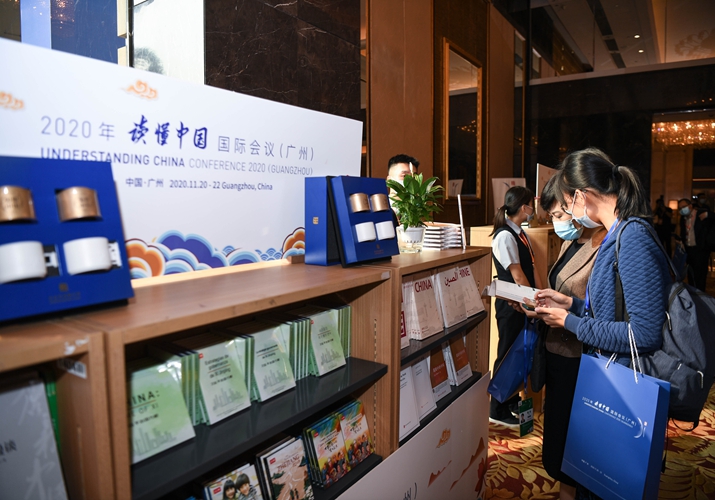| Voice |
| The need to grasp the complexity of contemporary China is more urgent than ever | |
|
|
 People read books at the Understanding China Conference in Guangzhou, Guangdong Province, south China, on November 20, 2020. Launched in 2013, the conference serves as a platform for the world to better understand China's development(XINHUA)
 The year 2021 is a big year for the People's Republic of China. Mid-year will see the 100th anniversary of the founding of the Communist Party of China. It will also mark one of the nation's centennial goals, referred to over the last few years, when the country achieves a moderately prosperous status. A lot of planning has already gone into how things will happen in July. At least, within China, there will be a lot going on. The year 2021 is a big year for the People's Republic of China. Mid-year will see the 100th anniversary of the founding of the Communist Party of China. It will also mark one of the nation's centennial goals, referred to over the last few years, when the country achieves a moderately prosperous status. A lot of planning has already gone into how things will happen in July. At least, within China, there will be a lot going on.A torrid year
Internationally, though, China had a torrid year in 2020. After the novel coronavirus disease struck, and the global outbreak, the tone of diplomacy generally changed. Part of this was due to the Donald Trump presidency, and the way in which from 2017 onward, he adopted an approach, and language, in international affairs which were highly unconventional. China was not the only country to encounter this new "narrative." Europeans and others, too, were berated for what Trump considered a lack of commitment to their own security, in financial terms at least. But China, through the trade tensions stemming from 2018, became a particular target of his attention and that of his second Secretary of State Mike Pompeo.
Throughout 2020, as countries struggled with the pandemic, the blaming, and the ensuing frustration and anger, started to boil over. The year became one typified by anger. With the election of Joe Biden as U.S. president starting from January, if nothing else, at the very least in terms of tone, U.S. diplomacy is likely to change.
Biden does not, and will not, express his ideas or attitudes in the way Trump did. This single fact offers the hope that whereas things will not magically change, they will become part of a discourse that is bound to be mildly more measured than it has been so far. Under the current circumstances, that is no small feat.
For China, 2020 came with many challenges. It was under the spotlight and its worldwide reach was more evident than ever. Gestures the nation felt were positive and well-intended, like sending personal protection equipment to Europe and elsewhere where the virus had had a particularly serious impact throughout April and into May 2020, were sometimes met with suspicion, and at times outright hostility. The response from several Chinese spokespeople to U.S. and others' criticisms was also fierce. Some days, social media served as a virtual battleground, though one where words became weapons.
Time to heal
One thing that 2020 certainly did bring to light is something that Chinese diplomacy needs to urgently pay attention to: Many people who never thought much about China, across the U.S., Australia and elsewhere, now have become aware of the country's importance, and of its direct impact on their own lives. For many of these people, their knowledge and understanding of the country's history, culture, language and situation are limited. They have never really had to think much about China, despite its rising importance, until the time came when they had to. 2020 was that time.
For many of these people, their main exposure will be to the language that several Western politicians use. This usually sprouts from the political objectives of the specific politician speaking. Some have acknowledged the complexity of the international situation in 2020. Yet others have been eager to generate a zero-sum blame game, with the main aim of preserving themselves. China basically was an easy target. It is hardly surprising that, in this situation, the overall dialogue between China and much of the outside world has become strained. 2021 must be the year for the wounds to heal.
For the West, much work lies ahead in terms of understanding the basics about China. At the moment, China, a country that accounts for 16 percent of global GDP and many feel is poised to become the world's biggest economy in the next decade, remains a place where basic levels of knowledge are inadequate. Because of this, simplified narratives of China as a place of unknowable but serious threats take hold. Some of these descriptions subsequently distort into truly nasty racial stereotyping, resulting in a bad atmosphere for all. Leaders across the West may have their valid reasons to be frustrated and angry in their diplomacy, but they need to make sure that these irritations are conveyed in ways which do not end up creating general antagonism and antipathy. They have a responsibility here.
For China, the effort to support education about the country continues to be a priority. This means, despite the suspicion and negativities in 2020, finding ways of supporting people-to-people links and exposing Western audiences to the reality of contemporary China, and, above all, its complexity. Such an approach will allow for some acknowledgement of the intricacy of the issues that China faces and helps erode this overly simplistic image of China as a place that is positioned as the absolute opposite of the West. Perhaps the measure might prove difficult and might take a lot of time and effort, not necessarily leading to an easy, measurable outcome. Nevertheless, it is hard to see how China can realize its potential as a global power when it is doing so with audiences abroad that are often ill-equipped to even understand what it's saying, let alone grasp the gravitas of matters.
Soft power
Chinese diplomacy should not shy away from acknowledging just how complex the current situation is—for everyone. There should be an insistence on the world outside at least embracing some level of nuance in the way it regards this newly emerging power, and of the many areas in which a partnership is important—from public health to the environment. Chinese leaders need to be reassured that the Trump presidency was not the norm, nor will it be. Policymakers, and the general public alike, are likely to recognize the need for nuance if they hear reasons for it from within China itself.
Fighting a discourse war is currently not China's battlefield. Unlike China's economy, China's soft power has a lot of catching up to do. Despite the increasing stress for diversity in Western society today, mainstream media seem to hold a highly unified view on China. It is strange that one fifth of humanity with plenty of diaspora should lack an authentic voice. Billions of individual stories are often reduced to GDP figures and geopolitical issues in the Western media. The more China feels it is misunderstood, the more defensive China becomes. This is not going to serve China's best interest in the long run.
China's spokespeople should instead reflect the nation's benign nature and its hospitality and willingness to open up and embrace. Blaming Western politicians and media is not going to bring knowledge to its targeted audience outside China's borders. The responsibility of educating the outside world about China falls on China. Apart from the existing channels like Xinhua, CGTN and the Confucius Institute, there needs to be more effort coming from the private sector.
These are not dramatic measures. And they entail hard, patient work. It is frustrating, as well, for China to often feel, as many of its spokespeople and citizens do, misunderstood and mischaracterized. This, alas, is the side effect of the country's new, and increasing, prominence. At least it is speaking to a world where more and more people understand its role and why that role matters. The main thing is to help people stop jumping to conclusions.
Nuance is the main thing for 2021. In an era of cast iron certainty, this is not a bad thing to aim for.
(Print Edition Title: Nuanced Understanding)
Kerry Brown is director of the Lau China Institute, King's College, London, as well as an associate fellow on the Asia-Pacific Program at Chatham House; Chenger Deng is a PhD student at the Lau China Institute, King's College, London
Copyedited by Elsbeth van Paridon
Comments to yanwei@bjreview.com
|
|
||||||||||||||||||||||||||||
|